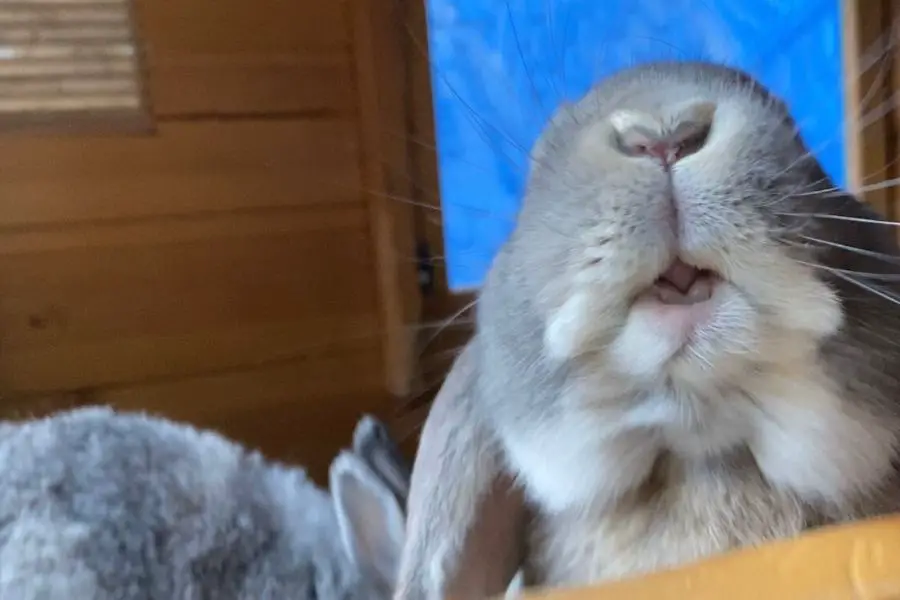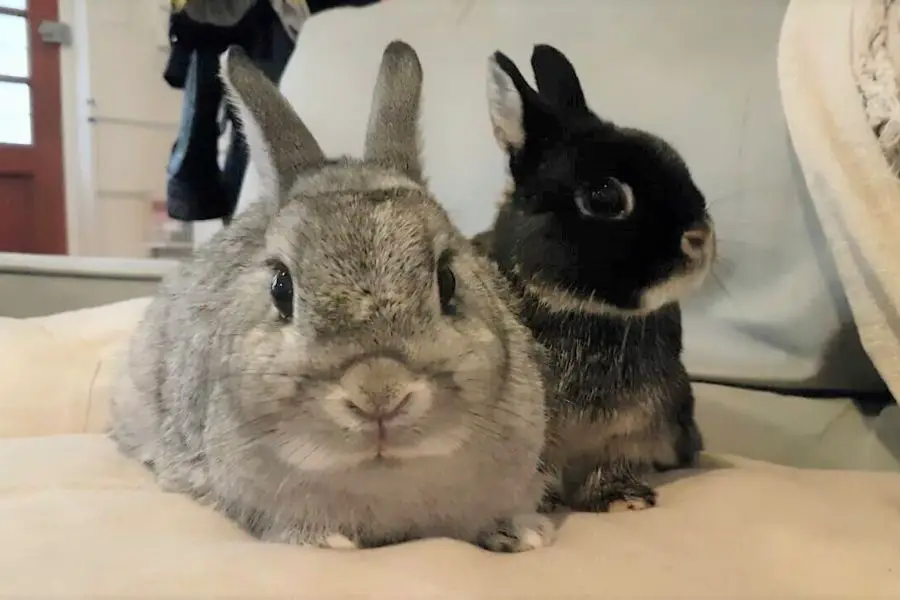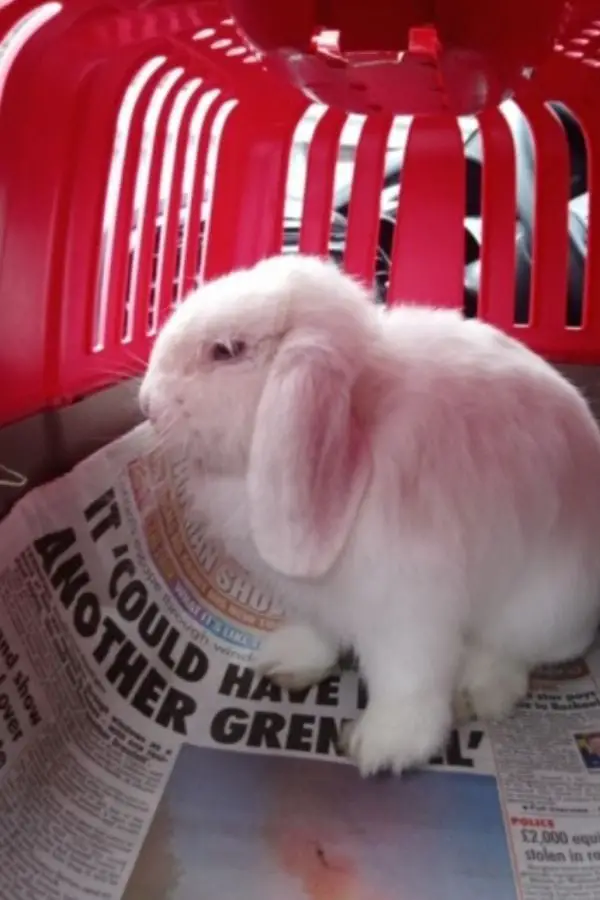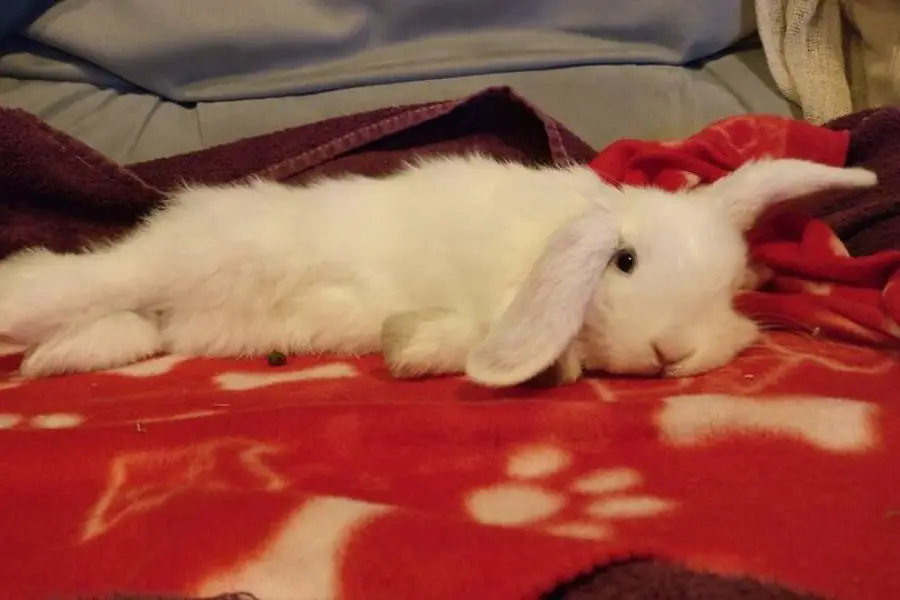Rabbits have a lot of curious behaviors, some of which can be easily explained while others have the potential to worry. One such habit that falls into this category is tooth grinding. So why do rabbits grind their teeth?
Rabbits grind their teeth for two distinct reasons. When they are happy and relaxed they gently grind (or chatter) their teeth creating a barely audible sound (a ‘purr’). The other type of tooth grinding is loud, aggressive, and is a sign that a rabbit is in pain.
Teeth grinding is something that is common rabbit behavior however when you first hear your rabbit grind his teeth it can be a worry.
Rabbits grind their teeth for a couple of different reasons but unlike other behaviors (e.g. nose twitching) when a bunny grinds its teeth, it’s nothing to do with communication.
What are the main reasons for a rabbit tooth grinding?
Here’s a quick summary of the reasons why your rabbit might grind his teeth, what he’s thinking, and most importantly when it should be a concern.

There are essentially two types of teeth grinding in rabbits, The first is a soft grinding (sometimes referred to as purring). Purring is no reason for you to worry. In fact, to experience your rabbit clicking his teeth in this way can be quite satisfying for any rabbit owner. It is an indication that you are doing a good job in the way you care for the rabbit.
The other type of grinding you may hear from a rabbit is a much louder more aggressive sound. This is usually audible without getting too close to the rabbit and can be a signal of a number of issues which if left untreated could lead to some very serious problems or even death for your rabbit.
Here is some more detail around each type of tooth grinding.
Rabbit purring
Purring is a type of tooth clicking that you will hear from a very comfortable, happy, and relaxed rabbit.
Owning a rabbit that is completely at ease with you is a good accomplishment for any owner. Anyone who has ever looked after a rabbit knows that they are often difficult pets to build a relationship with.
Many people who decide to buy or adopt a rabbit for the first time, find that rabbit ownership is often not what they expected. Baby’s are easier to look after however they quickly grow into adult rabbits that are not always as willing to interact.
Building a bond with an adult rabbit is not easy. While cats and dogs will follow you for food and petting, rabbits make you work for it. They are not easily motivated by food (except perhaps the occasional treat) and in general, will take significantly more effort before trusting you.
It takes patience to get a rabbit to like you. This is understandable when you consider the history of the rabbit species. As prey animals, they are considered dinner to just about everything bar insects!).

When a rabbit eventually learns to relax around you it will start to let you approach without it running away, continue to treat the rabbit with kindness for a significant period of time and eventually it might sit or lie close to you voluntarily and allow you to pet it. This is when you are likely to hear your rabbit start gently grinding his teeth.
When rabbits purr the noise will be barely audible without getting your head really close to the rabbit’s mouth. The sound produced will sound like gentle clicking. It may be consistent in rhythm or it may increase slightly when you hit a certain spot (that the rabbit particularly enjoys).
Aggressive grinding
The other reason that you may hear a rabbit grinding its teeth is a lot more worrying for owners. This is when a rabbit is in pain or discomfort, either mentally or physically.
Although rabbits will try to hide pain so as not to appear weaker in the eyes of a predator, sometimes pain is so great that a rabbit has no alternative than to display it. Rather than crying out and showing obvious weakness, a rabbit will instead grind its teeth.
Rabbits are particularly prone to uterine and testicular cancers if they are not spayed/neutered and tooth grinding is sometimes a rabbit’s response to the agony it is feeling.
What Does Tooth Grinding in Rabbits Sound Like?
As mentioned this kind of tooth grinding will be a lot more noticeable and aggressive as the rabbit tries to deal with the intense pain or discomfort.
It s not something that should ever be ignored and can be recognized as it is is significantly louder than the aforementioned pleasurable purring sound often heard during petting. It’s also a lot less consistent with short pauses in between grinding.
Aggressive grinding of this kind is usually accompanied by other symptoms of discomfort, for example a rabbit experiencing pain due to g.i stasis may also shift its body position as it tries in vain to get comfortable.
A rabbit usually does a good job of hiding discomfort or pain, however, there are a number of common symptoms of pain that you should also look out for. We’ve put them here along with some potential causes.
Other clues may include the body appearing tense and ears feeling cold if the pain is due to an illness.
| Symptom | Explanation |
|---|---|
| Antisocial behavior such as personality change or aggression | Obvious Changes in character Hutch rabbits who spend the majority of their time outside with little or no contact are likely to be aggressive if your turning up at the hutch for just a few minutes a day. However for those well looked after pets that have plenty of human interaction an uncharacteristic display of aggression can be a strong sign that the rabbit has a pain issue. |
| Reluctance to move or exercise | Pain after surgery Naturally rabbits will be reluctant to exercise for a while after a major operation like spayying or neutering and will be experiencing pain for a few days. Tooth grinding will be very likely. Injury Rabbits have fragile skeletal structures that are prone to injury. Their spines are particularly delicate, so much so that even handling a rabbit incorrectly can lead to injury or death (one of the reasons we don’t recommend rabbits as pets for young children (link to post ‘Is a Rabbit a Good Pet for a Child?) A fall or even an ill-timed binky can be enough to cause a painful injury. |
| Lack of grooming | Old age Like us, rabbits suffer from numerous issues when they age, two issues I have experienced with my own elderly rabbit are ‘lameness’ in the back legs and (the more painful of the two) arthritis, a condition my rabbit takes regular pain medication for. Not only can elderly rabbits feel pain from their ageing bones, but they may also have a very difficult time cleaning and grooming themselves, especially those hard to reach areas. This not only reflects in their appearance but may also lead to more painful health issues e.g. Flystrike. |
| Refusal to eat or drink | Gastrointestinal Issues One of the biggest risks to rabbits and experienced frequently by rabbit owners is a condition known as gastrointestinal stasis. This is when the intestinal tract slows down or stops its digestive processes. This condition can be caused by many things including insufficient fiber in the diet, a blockage such as a hairball, or even stress perhaps through losing a companion. Once the digestive processes slows down, harmful bacteria builds up in the rabbit’s abdomen and release a lot of extra gas into the intestines of the causing extreme pain and discomfort. A rabbit experiencing g.i. stasis will certainly be likely to grind its teeth and should see a vet immediately. Left untreated this condition is a killer. Dental issues Rabbit teeth are rootless and grow continuously. This is one of the reasons they require large amounts of coarse fibrous hay in their diet daily, as the chewing motion keeps the teeth trim. Failure to provide this vital aspect of a rabbit’s diet will almost certainly lead to pain. |
| Hunched posture | Gastrointestinal issues As described above |
If you are encountering any of these symptoms with a pet, the best course of action to take is to get the rabbit to a veterinarian as soon as possible.
Differentiating between the two types of tooth grinding
As mentioned, tooth purring is usually heard when a rabbit is extremely relaxed. Here is an example, this is Princess, my Netherland Dwarf male enjoying a head stroking session. Unfortunately, the audio is very quiet however rest assured, he was definitely purring!
If your still having difficulty differentiating between the two here are some other simple differences that can be observed.
| Tooth Grinding | Tooth Purring |
|---|---|
| Aggressive Sounding | Barely audible |
| Infrequent | Continued & rythmic |
| Eyes appear alert and fearful | Eyes appear relaxed and sleepy |
| Agitated and averse to touch | Relaxed and lethargic |
The differences betweeen the two types of tooth grinding are significant however as a new rabbit owner hearing one for the first time, it may be difficult to determine what your rabbits body language is actually telling you.
As someone who has experienced both purring and grinding at one time or another, this is the main thing I have noticed which can determine which type you may be hearing with your own rabbit.
It is very unlikely that a rabbit will allow you to pet them when they are experiencing pain. Rabbits are all about self-preservation. They do not want to become food for a hungry predator and will avoid contact if they are feeling sick or vulnerable. If your petting your rabbit and its teeth are chattering, it’s almost certain to be out of contentment rather than pain or discomfort.
What to do with a rabbit in pain
Unless you are a vet yourself, self diagnosing can be dangerous and may make the condition worse, especially in the case of a broken bone or injury.
For pre exisiting age related conditions such as arthritus, it is likely that a vet will prescribed ‘Metacam’ pain relief for your rabbit. This is fine and most can administer yourself. That said, never take unnecessary chances with your rabbits life, human medication especially is highly dangerous to a rabbit.

Rabbits deteriorate quickly and discovering a rabbit with an issue can be a harrowing experience for any owner. Rather than list things here that may or may not help to diagnose a rabbits painful condition, we absolutely recommend putting your rabbit gently inside a pet carrier and taking it to the nearest vet.
I personally have a vet 2 minutes away from my house however, even that did not stop me from losing a rabbit to gastrointestinal stasis. Time really is of the essence when dealing with a sick rabbit.
Stress and Tooth Grinding
Tooth grinding is not usually a response to a short sharp shock (e.g) the noise of a single firework, or the sight of a cat walking past a nearby window (as often happens with my own rabbits).
In these situations, rabbits will likely display disapproval through a foot stomp (the way a wild rabbit would alert other colony members of potential danger) rather than tooth grinding. Rabbits will generally hop away and hide if it feels uncomfortable with anything.
However, prolonged stress through either physical or mental discomfort can be enough to trigger tooth grinding in some rabbits. While the sound of the aforementioned single firework will probably just provoke a foot stamp, a fireworks display would likely cause significant mental trauma.
5 Reasons for stress and tooth grinding in rabbits
| Cause | Explanation |
|---|---|
| Inadequate food leading to poor health | A healthy diet is the most important thing you can provide to keep a rabbit happy and stress-free. A rabbit’s diet doesn’t need to be complicated however it should be high in fiber. This means 80% good quality grass hay. Coarse fibrous hays will not only keep the rabbit’s digestive system working as it should but will also ensure the teeth which are rootless will stay at a healthy length. Provide unlimited hay to your rabbit and chewable wooden toys to reduce the chance of dental stress (and also reduce the chance of having your furniture gradually destroyed!). To read more about a rabbit’s diet and prevent potential health issues see our detailed rabbit feeding guide here. |
| Percieved threat or danger | In the wild a rabbit needs to be constantly aware of its surroundings and potential dangers, specifically from the multiple dangerous predators that prey on them. Domesticated rabbits retain these instincts however most do not have the luxury of retreating to an underground warren if they feel threatened. If they are in an outdoor hutch a noisy lawnmower, a curious puppy, or other perceived predator peering in through the bars (with no means of escape for the rabbit) could cause significant stress leading to panic and stressful tooth grinding. |
| Loneliness/Lack of companionship | Rabbits are sensitive animals that crave companionship. Humans, do a fairly good job of providing friendship, however, we can never rarely meet the level of another rabbit companion (we just don’t have the communication tools!) Having always kept rabbits as pairs, I have never witnessed tooth grinding through loneliness, however for the short periods that I have kept rabbits outside a pair (usually between bonding sessions or after the loss of the companion rabbit) I have seen periods of depression including lack of appetite. From these occasions, it’s clear to me that lack of companionship over a sustained period of time could cause depression, ill health and potential stress that could lead to tooth grinding. |
| Boredom/Lack of space to exercise or small living space | Rabbits are extremely active and although domestic pets rarely have the same space available to them that their wild relatives do, they still need rabbits still need an adequate amount of space to burn off all that excess energy. Also, despite being a traditional dwelling choice for a pet rabbit, hutches are often, small, cramped and if left even for a day or two without cleaning and they become damp, unsanitary, bacteria-ridden and potentially uncomfortable. Put simply, its difficult for a rabbit to be happy in a traditional rabbit hutch. Both of these factors are closely related to overall health. Given sufficient space, playtime and a safe, secure and spacious place to live will ensure that the rabbit is mentally and physically enriched and much less likely to experience stress. |
| Excessive handling | Contrary to belief rabbits are not keen on excessive handling. This again relates back to their ingrained survival instinct which likens the handling by an inexperienced pair of hands as being scooped up by a dangerous predator such as a bird of prey. Rabbits are often purchased as pets for young children however, the realities of rabbit ownership really hit home when the rabbit reaches maturity. Rabbits approached or picked up by inexperienced hands will likely feel threatened, they may kick out, scratch, or even bite. Of course, if the threat of unwanted attention is persistent, it could of course result in stressful tooth grinding. |
How to encourage tooth purring and Prevent tooth grinding
Providing a rabbit with its essential needs is a sure way to encourage contented purring. Making a rabbit happy is not as simple as it sounds but here are the main things you can provide to ensure your relationship gets off to the best start.

A safe space to escape to
The first thing a rabbit needs is a place to live and play that is safe from danger. This will ensure the rabbit doesn’t incur any unnecessary injuries or stresses that may lead to tooth grinding.
Regardless of whether a rabbit is kept inside or outside pay attention to the location and remove any obvious environmental dangers e.g access to areas where your rabbit could fall from height while exploring. Also ensure there is no risk of attention from predators or for rabbits kept indoors, unwanted attention from other pets or young children.
As mentioned rabbits will be happiest if they know they have a space to escape to when they want some privacy (this is why indoor rabbits often go under a bed or behind a sofa to sleep).
A Healthy Diet
A healthy diet is the most important thing you can do for a rabbit. A good diet will help ward off ailments and illnesses that may cause pain and discomfort to a rabbit and possibly lead to tooth grinding.
Despite their complex gastrointestinal system, a rabbit does not need a complex and varied diet and although pet rabbits are often spoiled with all sorts of vegetables, and often unsuitable treat foods, however, its hay that is the staple of a rabbits diet.
Hay is a rabbits main source of fiber and eating it ensures that the muscles in the digestive system of the rabbit stay strong and keep the gut moving as it should. Coarse fibrous hay also ensures that the constantly growing teeth of the rabbit remain at a length that will not cause the rabbit any problems and prevent it eating or drinking.
Rabbits need to snack on hay constantly and so an unlimited amount should be provided at all times Failure to provide hay in a rabbits diet is a recipe for poor health, unhappiness and stress.
We can’t stress enough the importance of a good diet. Again, you may like to read our complete feeding guide.
Companionship
Despite being prey animals that are sometimes hard to read, rabbits are very affectionate animals. While building trust with a rabbit takes time it is one of the most rewarding things you can do especially when your rabbit sits next you on the sofa and purrs gently as you stroke or brush the top of it’s head.
In fact, it’s so great, I recorded it for you, here is a video of my little Netherland dwarf male princess enjoying some fuss.
Rabbits need companionship and although another rabbit will of course make the best companion in time you can get a rabbit to love, trust and even purr for you.
When the purring stops…..
Rabbits are energetic animals that don’t like to stay in one place for too long. Although a rabbit may enjoy a short head petting and purring session, its likely that it will eventually show signs of agitation or restlessness and will want to move.
At this point its better to let it go about its business rather than have all that great bonding go to waste by keeping it against its will.
Here are a few signs that will tell you it’s time to put the rabbit back down.
- Digging or scratching in your lap
- Grunting and nudging
- Nipping or biting (often at legs, fingers or chest)
- (And worst of all) peeing on you!
Wrap up
Take care of your rabbit well and provide him with plenty to chew on and hopefully the only grinding you will hear will be his purrs of pleasure as he enjoys his next petting session, however, keep in mind the signs and symptoms described in this article that may indicate illness. If you are at all concerned about your rabbit’s condition, take it to a vet immediately.
Further Reading
Why Do Rabbits Grind Their Teeth? pdsa.org.uk
Bunny Talk mybunny.org
How to tell the difference between good & bad teeth grinding rabbitsonline.net
